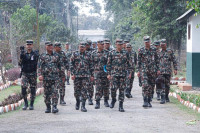National
Indian Army chief says Nepal objected to India’s opening of a road link via Lipulekh ‘at the behest of someone else’
The statement follows Nepal’s handing over of a diplomatic note to Indian envoy after Kathmandu and Delhi traded statements..jpg&w=900&height=601)
Post Report
As Nepal and India traded statements at the government level over Lipulekh via which New Delhi last week inaugurated a road link to Kailash Mansarovar in the Tibet Autonomous Region, sparking protests in Nepal, Indian Army chief General MM Naravane has alluded to Beijing as the instigating force for Kathmandu to raise its objection.
Naravane said on Friday that there were reasons to believe that Nepal objected to India laying a road connecting the Lipulekh pass “at the behest of someone else”, according to the Economic Times.
Naravane, however, stopped short of naming any country.
Nepal on Saturday issued a press note objecting to India’s move of opening a road link via Lipulekh, asking Delhi to stop carrying out any activities in the Nepali territory.
The same evening, India’s Ministry of External Affairs responded, saying the territory lies within Indian borders. The ministry, for the first time in the last six months since the Kalapani controversy emerged, acknowledged the need for talks to address the row.
“Both sides are also in the process of scheduling Foreign Secretary level talks which will be held once the dates are finalised between the two sides after the two societies and governments have successfully dealt with the challenge of Covid-19 emergency,” said the ministry.
Two days later, Nepal handed over a diplomatic note to Indian Ambassador Vinay Mohan Kwatra in Kathmandu, making Nepal’s position clear on Lipulekh.
But on Friday, the Indian Army chief described the reaction by Nepal as surprising.
"The area east of Kali river belongs to them. The road that we built is on the west of the river. There was no dispute. I don't know what they are agitating about," said Naravane at an interaction in New Delhi. “There has never been any problem in the past. There is reason to believe that they might have raised the issues at the behest of someone else and that is very much a possibility."
Six months ago, India showed Kalapani, which Nepal claims as its own, within its borders in a new political map it had published in line with Delhi’s decision to split up Jammu and Kashmir into federal territories. The move had then also sparked protests in Nepal. Kathmandu had not only handed over a diplomatic note but also sought talks at the Foreign Secretary level. Nepal’s Foreign Ministry said on Saturday that the government of Nepal twice proposed dates for a meeting of the foreign secretaries of the two countries, as mandated by their leaders.
“It is still awaiting a response from India,” said the ministry.




 8.44°C Kathmandu
8.44°C Kathmandu













